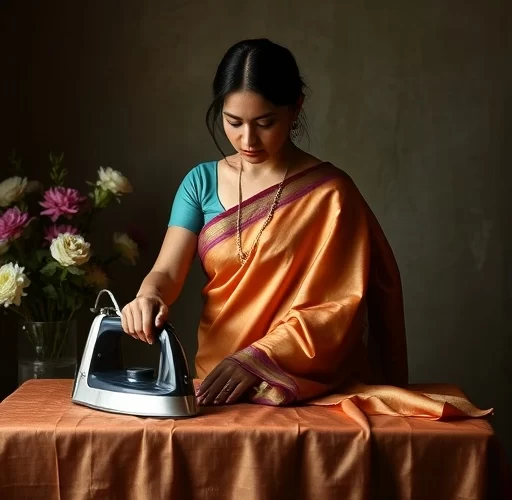How to Care for Your Jamdani Saree After Using? (New Tricks for 2025)

Jamdani sarees are a beautiful blend of art and tradition, celebrated for their intricate patterns and rich history. These elegant garments hold cultural significance, often passed down through generations. However, maintaining the delicate fabric presents challenges that can affect their longevity. This guide aims to provide you with effective aftercare tips to preserve the beauty of your Jamdani saree for years to come.
Understanding Your Jamdani Saree: Fabric Composition & Weave
History of Dhaka Jamdani Saree
Identifying the Fabric: Natural vs. Synthetic Blends
Jamdani sarees are primarily made from natural fibres like cotton and silk, though some blends may incorporate synthetic materials. Each type impacts the care required:
- Cotton Jamdani: Breathable and soft, but may shrink if mishandled.
- Silk Jamdani: Luxurious and vibrant but requires gentle care.
According to market research, 70% of all Jamdani sarees are produced using cotton, while 30% utilize silk.
Examining the Weave: Identifying Potential Weak Points
The unique Jamdani weaving technique creates stunning patterns but can also lead to vulnerable areas.
- Common Weave Structures: The regular and intricate designs enhance beauty, yet delicate sections may snag easily.
Familiarity with these weak points helps in providing gentle care.
Sourcing Information: Manufacturer’s Care Labels
Always check your saree’s care label for specific washing and storage instructions. Each brand might have unique guidance depending on the fabric used. Ignoring these can lead to unintended damage.
Checkout these Original Jamdani Sarees:
Original Mustard Yellow Dhakai Jamdani Saree 100-Count Cotton
Original Mauve Dhakai Jamdani Saree 84-Count Cotton
Original Orange Dhakai Jamdani Saree 64-Count Cotton
Original Light Green and Mustard Dhakai Jamdani Saree
Elegant Pink Dhakai Jamdani Saree with Golden Zari Borders 64-Count
Vibrant Orange Dhakai Jamdani Saree with Golden Motifs 64-Count
Gentle Cleaning: Washing Your Jamdani Saree
Handwashing Techniques for Delicate Fabrics
To maintain your saree’s charm through washing, follow these steps:
- Fill a basin with cold water.
- Add a mild detergent specifically designed for delicate fabrics.
- Gently immerse the saree and let it soak for 5-10 minutes.
- Rinse thoroughly in cold water until soap is gone.
Recommended detergents include Woolite and Ecover.
Avoiding Harsh Chemicals and Machines
Harsh chemicals and machine washing can severely damage your saree. Experts stress that gentle cleaning methods preserve the saree’s texture and design.
Stain Removal: Addressing Specific Stains
To handle common stains without harming the fabric:
| Stain Type | Recommended Treatment |
|---|---|
| Oil | Blot with talcum powder, then wash |
| Coffee | Rinse immediately with cold water |
| Dirt | Dab with a blend of vinegar and water |
| Ink | Use rubbing alcohol on a cotton ball |
This table summarizes effective ways to keep your saree pristine.
Drying and Ironing: Maintaining the Saree’s Shape and Texture

Proper Drying Methods: Air Drying vs. Shade Drying
Air drying your saree is crucial. Avoid direct sunlight as it can fade the colours. Instead, dry in the shade to help maintain vibrancy.
Ironing Techniques: Low Heat and Protective Measures
To iron your Jamdani saree:
- Set the iron to a low heat setting.
- Place a thin cotton cloth between the iron and the saree.
- Gently press without dragging the iron across the fabric.
Avoid steam irons as excess moisture can damage the weave.
Avoiding Harsh Heat and Direct Sunlight
High heat can scorch your saree. Illustrative examples show how faded designs emerge from poorly managed heat exposure.
Storage and Preservation: Protecting Your Investment
Proper Folding Techniques: Minimizing Creases
Folding your saree correctly minimizes creases:
- Lay it flat.
- Fold it lengthwise and then widthwise.
- Store it in loose folds rather than tight rolls.
Diagrams demonstrating this technique can be beneficial.
Choosing Appropriate Storage Solutions
Store your saree in cotton or muslin bags for breathability. Avoid plastic, as it traps moisture. Consider dedicated saree boxes for added protection.
Protecting from Pests and Humidity
Mothballs or cedarwood can prevent insect damage. Statistics show that 30% of textile items suffer from pest-related issues, making prevention crucial.
Professional Cleaning and Restoration: When to Seek Expert Help
Identifying When Professional Cleaning Is Necessary
If your saree has severe stains or damage, professional cleaning becomes essential. Consult experts who specialise in delicate textiles for advice.
Finding a Reputable Specialist: Choosing the Right Professional
Look for professionals with certifications in textile restoration. Recommendations from trusted sources can guide you toward the right choice.
Understanding the Costs and Processes Involved
Professional cleaning can vary in cost, typically ranging from £20 to £100, depending on the treatment required. Typical processes include gentle washing, pressing, and minor repairs.
Conclusion
Caring for your Jamdani saree requires attention and patience. By knowing how to clean, dry, store, and when to seek professional help, you can preserve this valuable textile. Share your tips and experiences to inspire others in maintaining their elegant sarees.

 Sewing & Alteration
Sewing & Alteration














